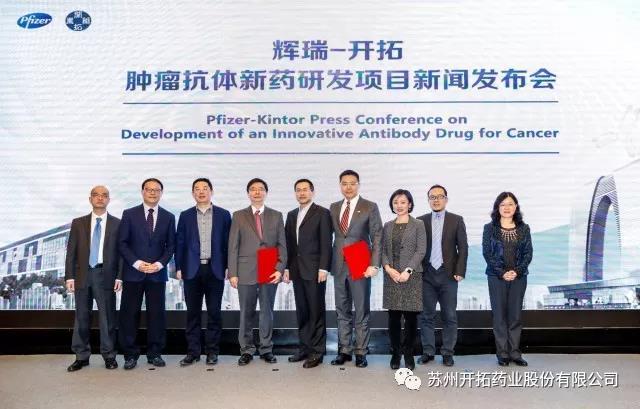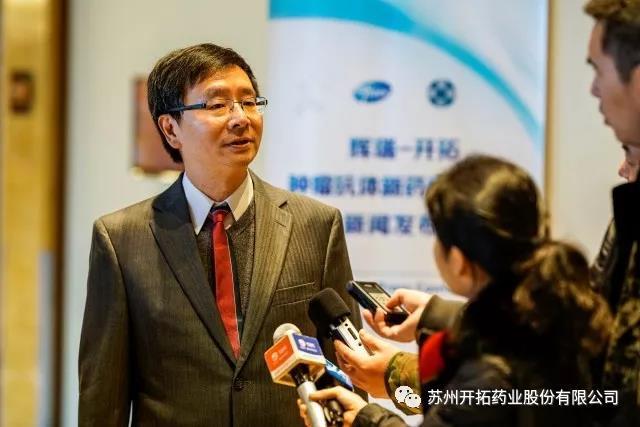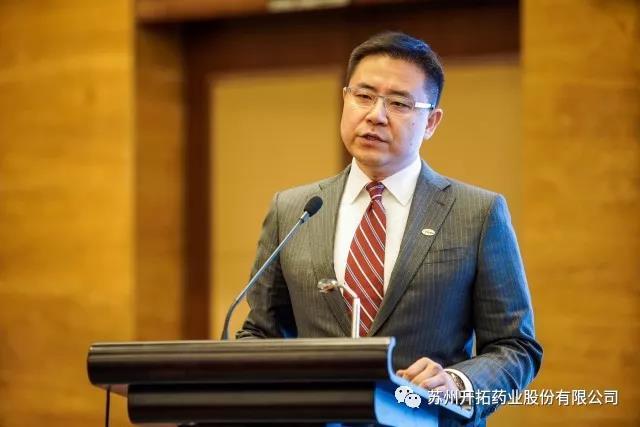Suzhou Kintor Receives Pfizer-Granted Global Development Rights for An Innovative Antibody Drug for Cancer
Release time:2018-01-24 16:17
(January 24, 2018, Suzhou) Suzhou Kintor Pharmaceuticals, Inc. (hereinafter referred to as "Suzhou Kintor") and Pfizer Inc. (“Pfizer”) held a press conference on the development project of innovative antibody drug for cancer in Suzhou today. Under the agreement, Pfizer will grant Suzhou Kintor the exclusive license to develop, produce and commercialize an innovative antibody drug for cancer globally. This is the first time that Pfizer has authorized the license to develop innovative antibody drug to a local Chinese enterprise. The drug is also expected to become the world's first fully human therapeutic monoclonal antibody against Activin receptor-like kinase-1 (ALK-1) target.

About ALK-1
In 2015, the number of new liver cancer patients in China was 466,000, accounting for half of all new liver cancer cases worldwide. Liver cancer features difficult early diagnosis, high malignancy, rapid disease progression, and great treatment difficulty. Although there are various treatment means such as surgery, liver transplantation, and interventional treatment, liver cancer treatment effect is still unsatisfactory. Generally, advanced patients have a survival time of merely 6 months after diagnosis. To develop innovative drugs for liver cancer, a high-incidence cancer type in China, thus bringing clinically innovative and effective treatment options to the majority of liver cancer patients in China, is a common goal of the Group and Pfizer.
In the treatment of liver cancer, targeted therapy provides one of the key development directions in the future. A variety of monoclonal antibody drugs have also been widely used in the treatment of various diseases. Meanwhile, the development of monoclonal antibodies against different targets is in full swing around the world. ALK-1 is mainly expressed in vascular endothelial cells, which is related to the growth and migration of endothelial cells. By blocking this receptor, it is possible to produce tumor angiogenesis inhibitory effects, reduce tumor vascular blood flow and angiopoiesis, thereby effectively slowing the tumor progression. ALK-1 has a special target and produces a wide range of effects in tumor biology, which can not only inhibit angiopoiesis, but also cause changes in tumor microenvironment. The use of ALK-1 antibody as a drug to change the tumor microenvironment combined with other target drugs is in line with the modern concept of anti-tumor combined therapy. It is reported that the drug of this cooperation project is expected to become the world's first fully human monoclonal antibody drug targeting at ALK-1 receptor blockade.
The drug was initially developed by Pfizer, with two phase I clinical trials completed in the United States, Italy, South Korea, and Japan in 2014. The effect was validated in nearly 100 patients with advanced solid tumors. The drug is safe, and some patients have achieved objective remission. A certain disease control rate has been achieved in liver cancer patients of the dose extension group. The above preliminary test results urgently need to be verified in phase II clinical trials.
About this cooperation
It has always been the mission of Suzhou Kintor to explore new ideas for tumor treatment and develop innovative drugs of world-class level. Since its inception, Suzhou Kintor has been focused on the research of innovative tumor drugs, bringing together top experts and teams in all fields and accumulating rich experiences in novel drugs development. There are currently many anti-tumor drugs under development. Where, a class of novel drugs in the field of prostate cancer treatment--AR antagonist proxalutamide, has successfully entered phase II clinical research. As the Group grows and develops, Suzhou Kintor is constantly perfecting its R&D strategy and product pipelines. This project represents the first time that Pfizer authorizes the global development right of new antibody drug to a local Chinese enterprise, Suzhou Kintor. Through the cooperation with Pfizer, Suzhou Kintor will take advantage of its own strong R&D strength to take over the follow-up research and development of Pfizer's ALK-1 monoclonal antibody.

Dr. Youzhi Tong, President of Suzhou Kintor
This ALK-1 project cooperation marks a major milestone for comprehensive implementation of Pfizer's R&D localization strategy. As a leading foreign pharmaceutical company in China, Pfizer actively responds to the strategic planning in “Healthy China 2030 Outline”: vigorously developing bio-industry, promoting pharmaceutical innovation, transformation and upgrading. Committed to in-depth R & D localization, it introduces global R&D experiences and proprietary technologies, establishes various forms of innovative strategic cooperation with local pharmaceutical enterprises to boost the comprehensive improvement in local R&D capabilities, systems, technology patents, talent cultivation and innovation culture. Also, it works with local companies to develop more innovative drugs to benefit people’s health and well-being of China and the world.

Mr. Kun Wu, Head of Pfizer Global Innovative Healthcare in China
Under the agreement, Pfizer will license the rights to worldwide research, development, production and commercialization of ALK-1 to Suzhou Kintor, and will provide results of already completed pre-clinical and phase I clinical research as well as support in proprietary technologies. At the same time, Pfizer has retained relevant right for options at different R&D stages in order to obtain right to develop, produce and commercialize ALK-1 in markets outside China. Based on the results of the phase I clinical trials, Suzhou Kintor will carry out global multi-center phase II clinical trials and other clinical trials such as combined-therapyof different drugs, and will start relevant work to transfer drug production to China. At the same time, Suzhou Kintor will also actively expand and explore the application of the drug in cancers other than liver cancer, with a view to benefit the majority of patients as early as possible.
recommend News
2024-07-01
2024-06-05


